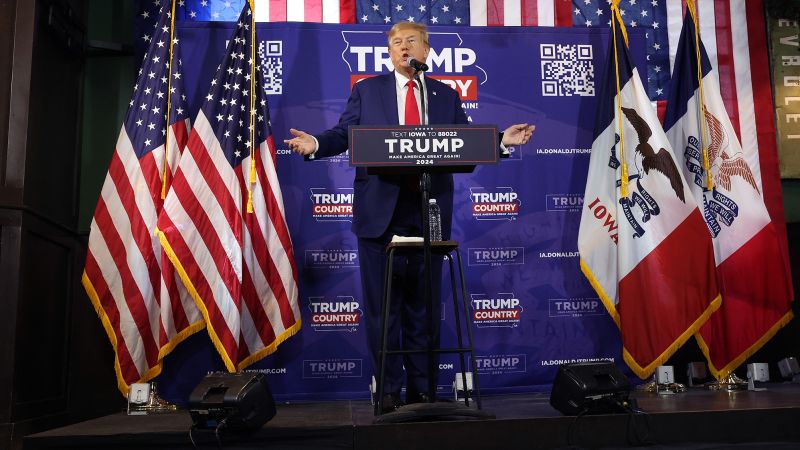Editor’s Note: A version of this article first appeared in the “Reliable Sources” newsletter. Sign up for the daily digest chronicling the evolving media landscape here.
The American press is facing, arguably, the gravest potential threat to its freedom in a generation.
The four-time indicted, twice-impeached disgraced former president, Donald Trump, who admitted Tuesday that he will govern as a “dictator” on “day one” should he win office again, is overtly vowing to weaponize government and seek retribution against the news media, showing no regard for the First Amendment protections afforded to the Fourth Estate.
The alarming rhetoric against the nation’s journalists, whom Trump has consistently and insidiously referred to as the “enemy of the people,” has also been echoed by his top allies, indicating the promises of revenge are not the rantings of a madman, but the actual intended course of action should the Republican presidential frontrunner manage to seize power again.
In a particularly disturbing conversation this week, Trump’s former top political strategist, Steve Bannon, and former National Security Council adviser, Kash Patel, openly discussed plans to target the press. Bannon, who underscored that such promises are “not just rhetoric” and that they are “absolutely dead serious” about seeking revenge against journalists, asked Patel, who would likely serve in a second Trump administration, whether he could “deliver the goods.” Patel responded affirmatively, vowing that a re-empowered Trump would indeed “come after” the press.
Bannon did not respond to requests for comment on Wednesday and a spokesperson for Patel claimed he was only referring to targeting journalists “who break the law.” Regardless, Trump has himself said he will target news organizations, including most recently lashing out at Comcast over NBCU News Group’s coverage of him, saying the company should be “investigated.”
“I say up front, openly, and proudly, that when I WIN the Presidency of the United States, they and others of the LameStream Media will be thoroughly scrutinized for their knowingly dishonest and corrupt coverage of people, things, and events,” Trump declared in September, adding that he believes the press “should pay a big price” for supposedly hurting the country.
President Joe Biden’s campaign on Wednesday denounced the anti-press venom being injected into the public discourse by Trump and his allies.
“Donald Trump and his cabal of snowflake henchmen are telling us what they will do if they get power. The plan apparently includes stomping on the bedrock principles of the First Amendment speech by locking up and punishing journalists for simply doing their jobs,” Ammar Moussa, a spokesperson for the Biden campaign, told me in a statement. “The 2020 election and last year’s midterms made clear the American people will not accept these kinds of overt and existential attacks on our democracy.”
But the reality is that Trump could be elected again. And his appalling rhetoric adds even more evidence to the already mountain of examples that signal he aims to behave like an authoritarian, should he manage to secure the White House in 2024, said Ruth Ben-Ghiat, a history professor at New York University who focuses on authoritarianism and democratic backsliding.
“All autocrats consider the free press their enemy, and use legal harassment, imprisonment, and other methods to silence journalists,” Ben-Ghiat told me.
“Trump, Patel, and others have already sued CNN and many other media outlets for defamation, and in doing so they are in line with authoritarians who use lawsuits to financially and psychologically exhaust journalists and media outlets.”
Ben-Ghiat added that such public threats “are also attempts to get media outlets to self-censor.” She stressed “autocratic media environments depend not only on the dissemination of talking points friendly to the leader, but also on silence about anything the autocrat does not want the public to know.”
Floyd Abrams, the famed First Amendment attorney, told me that he believes “a second Trump term would gravely threaten freedom of the press” and outlined a number of potential actions that could be taken to retaliate against the news media. Abrams said a second Trump administration could bring potential Espionage Act cases against outlets over the publication of internal deliberations regarding government actions; repeal Department of Justice guidelines barring subpoenas to hunt leakers; and take anti-press positions in the U.S. Supreme Court, among other things.
Ted Boutrous, another First Amendment attorney, said the comments from Patel were “disgusting,” “fundamentally un-American,” and described actions “that seek to stick a dagger in the heart of the First Amendment.” But Boutrous stressed that the rhetoric on display for the public “should be taken seriously, given Mr. Trump’s and his staff’s egregious actions when Trump was in office.”
Press freedom groups also spoke out on Wednesday against the anti-press fervor coursing through the MAGA-dominating wing of the Republican Party.
“This kind of inflammatory rhetoric has no place in U.S. democracy,” Katherine Jacobsen, who heads U.S. affairs for the Committee to Protect Journalists, told me. “Thuggish threats to ‘come after’ members of the media in retaliation for their work covering elections is incredibly concerning, and creates a permission structure for violence against journalists.”
Read the full article here




